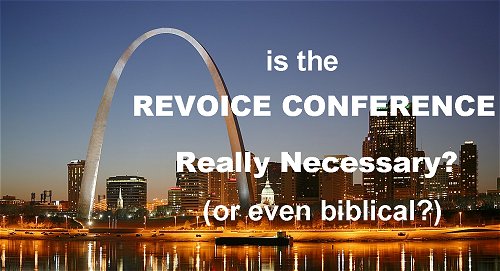The Revoice Conference is a pro-LGBT conference designed to “revoice” (or “to update or refurbish with a new, fresh voice.” – according to their website) the “conversation” between heterosexual Christians and “celibate LGBT Christians,” and Christians who experience same-sex attraction. Do you sense a problem with this? Yeah, I thought so, and I sense it as well. The conference is being held next month in St. Louis, Missouri at Memorial Presbyterian Church (PCA). Yes, PCA. The Presbyterian Church in America. If the PCA denomination endorses this conference, then the problem is more widespread than I thought.
Same-sex attraction is a cleaned up, dressed up, politically correct term for homosexual attraction. Nothing more, nothing less. The problem I see with the concept behind Revoice is, that homosexuality is a sin. So, in reality Revoice is a conference that is centered around an examination of, and a discussion of, and an embracing of sin. In this case, the sin of homosexuality. Some are saying this conference is a bad idea, some say it is a good idea and long overdue as there are professing Christians who experience same-sex (homosexual) attraction
According to the Revoice Conference website, Revoice 2018 is designed around, “Supporting, encouraging, and empowering gay, lesbian, same-sex-attracted, and other LGBT Christians so they can flourish while observing the historic, Christian doctrine of marriage and sexuality” the conference bills itself as offering:
- New Community. “Gather together with other gender and sexual minorities and those who love them and experience a new kind of gospel community.”
- Better Conversation. “Listen to, learn from, and participate in conversations with speakers who bring a nuanced perspective to the table of discussion.”
- Diverse Collective. “Benefit from curated presentations on a wide variety of topics related to LGBT experience and the historic, Christian sexual ethic.”
Rekindling Hope as a Sexual Minority in the Church
How can we fight back against the temptation towards despair of being a sexual minority committed to historic Christian teachings on sex? How might we engage our longings as we await our King's return? Join me as we consider what it may look like to abound in hope, together
Journey to Embrace: A Conversation on Empowering the Church to Embrace the LGBT+ Community in Fresh Ways
How can we live in harmony with the historic Christian sexual ethic while also radically embracing the LGBT+ community?
Redeeming Queer Culture: An Adventure
For the sexual minority seeking to submit his or her life fully to Christ and to the historic Christian sexual ethic, queer culture presents a bit of a dilemma; rather than combing through and analyzing to find which parts are to be rejected, to be redeemed, or to be received with joy (Acts 17:16-34), Christians have often discarded the virtues of queer culture along with the vices, which leaves culturally connected Christian sexual minorities torn between two cultures, two histories, and two communities. So questions that have until now been largely unanswered remain: what does queer culture (and specifically, queer literature and theory) have to offer us who follow Christ? What queer treasure, honor, and glory will be brought into the New Jerusalem at the end of time (Revelation 21:24-26)?
What if, however, Revoice was about a sin other than the sin of homosexuality? Would it still be as attractive? Would people really want to be associated with such a thing? When you replace the sin of homosexuality with a different sin in the Revoice literature, the reality of what Revoice actually is (in spite of all the assurances given by its supporters) soon becomes clear. An acceptance of sin. So let's do that. What if Revoice was about liars? What happens if we revise the Revoice website to be a conference about “Christian liars?”
Revoice 2018
Supporting, encouraging, and empowering liars, those who lie, those attracted to lying, and other lying Christians so they can flourish while observing the historic, Christian doctrine of telling the truth.
New Community. Gather together with other liars and truth-challenged minorities and those who love them and experience a new kind of gospel community.
Better Conversation. Listen to, learn from, and participate in conversations with liars who bring a nuanced perspective to the table of discussion.
Diverse Collective. Benefit from curated presentations on a wide variety of topics related to the liar experience and the historic, Christian truth ethic.
Workshops
Rekindling Hope as a Truth-Challenged Minority in the Church
How can we fight back against the temptation towards despair of being a truth-challenged minority committed to historic Christian teachings on truth? How might we engage our longings as we await our King's return? Join me as we consider what it may look like to abound in hope, together.
Journey to Embrace: A Conversation on Empowering the Church to Embrace the Liar Community in Fresh Ways
How can we live in harmony with the historic Christian truth ethic while also radically embracing the liar community?
Redeeming Liar Culture: An Adventure
For the truth-challenged minority seeking to submit his or her life fully to Christ and to the historic Christian truth ethic, liar culture presents a bit of a dilemma; rather than combing through and analyzing to find which parts are to be rejected, to be redeemed, or to be received with joy (Acts 17:16-34), Christians have often discarded the virtues of the liar culture along with the vices, which leaves culturally connected Christian truth-challenged minorities torn between two cultures, two histories, and two communities. So questions that have until now been largely unanswered remain: what does the liar culture (and specifically, liar literature and theory) have to offer us who follow Christ? What liar treasure, honor, and glory will be brought into the New Jerusalem at the end of time (Revelation 21:24-26)?
Or, what if Revoice was about murderers? What happens if we revise the Revoice website to be a conference about “Christian murderers?”
Revoice 2018
Supporting, encouraging, and empowering murderers, those who murder, those attracted to murder, and other murdering Christians so they can flourish while observing the historic, Christian doctrine of the sanctity of life.
New Community. Gather together with other murderers and murder-oriented minorities and those who love them and experience a new kind of gospel community.
Better Conversation. Listen to, learn from, and participate in conversations with murderers who bring a nuanced perspective to the table of discussion.
Diverse Collective. Benefit from curated presentations on a wide variety of topics related to the murder experience and the historic, Christian sanctity of life ethic.
Workshops
Rekindling Hope as a Murder-Oriented Minority in the Church
How can we fight back against the temptation towards despair of being a murder-oriented minority committed to historic Christian teachings on the sanctity of life? How might we engage our longings as we await our King's return? Join me as we consider what it may look like to abound in hope, together.
Journey to Embrace: A Conversation on Empowering the Church to Embrace the Murder Community in Fresh Ways
How can we live in harmony with the historic Christian sanctity of life ethic while also radically embracing the murderer community?
Redeeming Murderer Culture: An Adventure
For the murder-oriented minority seeking to submit his or her life fully to Christ and to the historic Christian sanctity of life ethic, murderer culture presents a bit of a dilemma; rather than combing through and analyzing to find which parts are to be rejected, to be redeemed, or to be received with joy (Acts 17:16-34), Christians have often discarded the virtues of the murderer culture along with the vices, which leaves culturally connected Christian murder-oriented minorities torn between two cultures, two histories, and two communities. So questions that have until now been largely unanswered remain: what does the murderer culture (and specifically, murderer literature and theory) have to offer us who follow Christ? What murderer treasure, honor, and glory will be brought into the New Jerusalem at the end of time (Revelation 21:24-26)?
And just one more. Since Revoice is about a sexually immoral sin, let's change that sin to a different sexually immoral sin. What if Revoice was about pedophiles? What happens if we revise the Revoice website to be a conference about “Christian pedophiles?”
Revoice 2018
Supporting, encouraging, and empowering pedophiles, those who engage in pedophilia, those attracted to pedophilia, and other pedophilic Christians so they can flourish while observing the historic, Christian doctrine of marriage and sexuality.
New Community. Gather together with other pedophiles and sexual deviant minorities and those who love them and experience a new kind of gospel community.
Better Conversation. Listen to, learn from, and participate in conversations with pedophiles who bring a nuanced perspective to the table of discussion.
Diverse Collective. Benefit from curated presentations on a wide variety of topics related to the pedophilia experience and the historic, Christian truth ethic.
Workshops
Rekindling Hope as a Sexual Deviant Minority in the Church
How can we fight back against the temptation towards despair of being a sexual deviant minority committed to historic Christian teachings on marriage and sexuality? How might we engage our longings as we await our King's return? Join me as we consider what it may look like to abound in hope, together.
Journey to Embrace: A Conversation on Empowering the Church to Embrace the Pedophilic Community in Fresh Ways
How can we live in harmony with the historic Christian marriage and sexuality ethic while also radically embracing the pedophile community?
Redeeming Pedophile Culture: An Adventure
For the sexual deviant minority seeking to submit his or her life fully to Christ and to the historic Christian marriage and sexuality ethic, pedophile culture presents a bit of a dilemma; rather than combing through and analyzing to find which parts are to be rejected, to be redeemed, or to be received with joy (Acts 17:16-34), Christians have often discarded the virtues of the pedophile culture along with the vices, which leaves culturally connected Christian pedophile minorities torn between two cultures, two histories, and two communities. So questions that have until now been largely unanswered remain: what does the pedophile culture (and specifically, pedophile literature and theory) have to offer us who follow Christ? What pedophile treasure, honor, and glory will be brought into the New Jerusalem at the end of time (Revelation 21:24-26)?
Now, I am not saying that homosexuals or those experiencing homosexual attraction are liars, murderers or pedophiles. Not by a long shot. Nor do I believe that they are. Again, not by a long shot. I trust, however, that by changing the topic of the conference from one sin to another you can see the anti-biblical, anti-Christian reality of the Revoice Conference. Do Christians who struggle with homosexual attraction/temptation need and deserve our understanding, our love, our compassion, our prayer, our fellowship? Absolutely. By the same token, Christians who struggle with the temptation to lie, steal, commit adultery, fornicate, murder, etc., also need the same level of love, compassion, prayer, fellowship, etc. What Christians who struggle with homosexual attraction/temptation do not need is a conference that tells them its okay to experience homosexual attraction/temptation. They do not need to be told that one can be both homosexual and a Christian; because the simple fact is, there is no such thing as a “gay Christian,” or a “lesbian Christian.” There are no “LGBT Christians.” The entire LGBT ethos is antithetical to God, to Scripture, and to Christianity.
The bottom line is this, homosexuality is a sin. It is an abomination to God. Scripture clearly and explicitly teaches this. And having a conference replete with discussions, lectures and workshops all centered around how to embrace sin, accept sin, look for the good in sin; and to support, encourage and empower those who are struggling with the temptation to sin “so they can flourish” in the Church is unbiblical to the Nth degree.
All Christians struggle with the temptation to sin. It's part of being human. It's caused by living in a corrupt human body, made corrupt by the sin of Adam; and the only – THE ONLY – way to overcome those temptations is to follow the God prescribed treatment plan set forth in Scripture:
1. Recognize your sin for what it is: SIN, and it is an affront to the holy and righteous God whom we serve.
2. Recognize that sin is endemic to all mankind. We are all infected with it, both believer and unbeliever alike. The difference between the two is, however, that while unbelievers are enslaved to their sin, chained, shackled, and controlled by their sin; the Christian is not. The Christian has the ability, through Christ, to be victorious over their sin nature. Not completely free from sin (which will only happen when we receive our glorified bodies), but no longer chained to and controlled by our sin.
3. Confess your sin to God, sincerely repent of your sin, and God, who is faithful and true will forgive your sin. Do this every time you sin, whether physically sin, or sin in your heart and mind. Confess it, repent of it, in all truth and sincerity. Every. Single. Time.
4. Understand the purpose of trials and temptations. They are not arbitrary. They do not randomly happen to Christians; and they do serve a purpose. They not only teach us to be patient in waiting on the Lord for our deliverance; they not only teach us to stand strong in the Lord; they not only teach us to be dependent on the Lord; but through the grace, mercy and strength of the Lord, they actually enable us to do these things. This is what can be referred to as the maturation aspect of sanctification. When you were born again in Christ, you became a new creation; and, like any new born, growth takes time and is not without its share of skinned knees and stubbed toes. It is a process of growth that helps us grow in Christ likeness, in holiness, in Christian maturity. The Bible refers to this process as being transformed by the renewing our our mind and the mortification of the flesh.
4. Ensure you are in His word daily. And I am not talking about a quick five minute devotional reading. I am talking about taking your time – serious time, and studying His word. Give up an hour or two of television watching if you have to, and give that time to the One who died for you.
5. Spend time, again, serious time, in prayer. Real prayer. Confessional, supplicatory, worshipful, sincere prayer. At least once a day, but more often if possible.
6. Surround yourself with God's people. Corporate worship, corporate prayer, fellowship. The love and encouragement that is shared among true believers in God is unequaled in any other environment.
7. Trust God. No, I mean sincerely trust God. If you believe in Him, if you believe in Jesus Christ, then really believe in Him. Love Him with all your heart, all your mind, and all your soul. With all that you are and with all that you have. Follow Him without hesitation. Obey Him without question. Live for Him without condition.
There you have it. Seven steps to biblically dealing with same-sex (homosexual) attraction; or any attraction to sin and the temptation to sin. No conference necessary, because God does not need a conference, nor can He be replaced by one regardless of how well meaning they may ostensibly be.
A final word for Christians struggling with same-sex (homosexual) attraction, or attraction to any sin and/or the temptation to sin. A brief lesson to remember and to constantly remind yourself of. We have three enemies in life. No, not the office bully, or unbearable neighbor, or some other human enemy; but three real enemies who are equally deceitful, dangerous, and damaging. They are our outer enemy: The World; our inner enemy: The Flesh; and our arch-enemy: Satan. Each one will cajole, coerce, lure with attractive bait, deceive, lie, damage and destroy. The World will use peer pressure, advertising, entertainment, so-called “societal norms,” threats, legislation, litigation and more all in a concerted effort to get you to sin, to accept sin, to condone sin, and to deny your faith in one way or another. The Flesh will also cajole, coerce and lure you to sin. It will tell you, “It's okay. It's not really sin to just fantasize about it. Come on, everyone is doing it. You want people to like you don't you? You don't want to stand out like a sore thumb. You don't want to be arrested do you?” The Flesh will use many of the same tactics the World does, but on a more personal level. And Satan, the dragon, the deceiver, the father of lies, the prince of the power of the air. He will utilize all of these tactics, and more, and on an industrial scale. Not only will he attack us, but he has an army of demonic minions at his beck and call to do his dirty bidding in attacking us. But that's okay. As our Lord Jesus has said, “...in Me you may have peace. In the world you will have tribulation. But take heart; I have overcome the world.” (John 16:33 ESV)




 RSS Feed
RSS Feed
